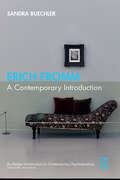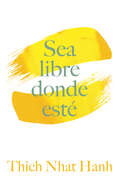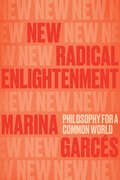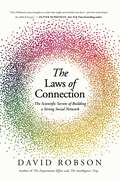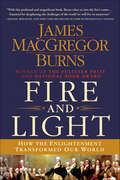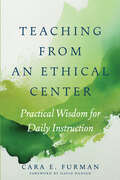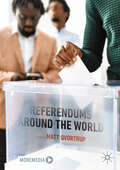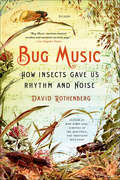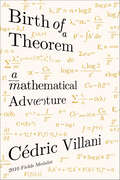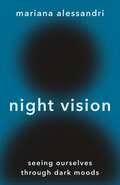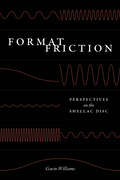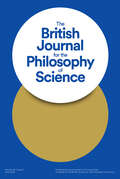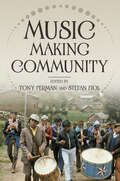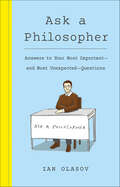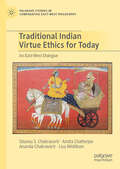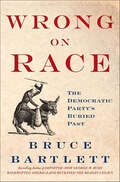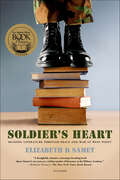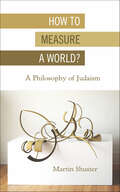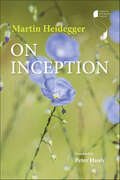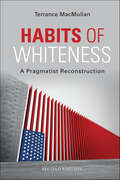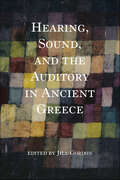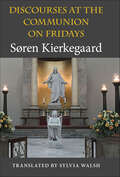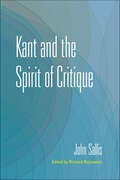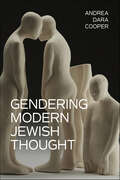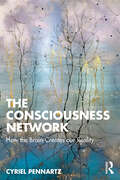- Table View
- List View
Erich Fromm: A Contemporary Introduction (Routledge Introductions to Contemporary Psychoanalysis)
by Sandra BuechlerIn this passionate volume, Sandra Buechler introduces Erich Fromm's groundbreaking contributions to psychoanalysis, sociology, philosophy, political action, and social criticism. | Buechler explores how Fromm's thinking and interdisciplinary vision are able to frame discussions of dilemmas in contemporary society. She offers a comprehensive biography of Fromm, before delving into his role as analyst, author, activist, sociologist and philosopher. From her own experience as a psychoanalyst, and from the testimony of Fromm's many ardent followers, Buechler illuminates Fromm's capacity to inspire. She considers how Fromm's writing equips students, beginning clinicians and more experienced professionals to understand what can give meaning to their efforts on behalf of troubled individuals, their riven communities, and the wider world. | Assuming no prior knowledge of Fromm's work, this books offers students in clinical and social psychology, sociology, and philosophy a vital insight into his theoretical contributions. It will also be of interest to psychoanalysts, psychologists and social workers.
Sea Libre Donde Esté: Una guía práctica para vivir con plena consciencia
by Thich Nhat HanhFreedom is not given to us by anyone; we have to cultivate it ourselves. This compendium of the core teachings of Thich Nhat Hanh, based on a talk given at a prison, shows how mindfulness practice can cultivate freedom no matter where you are.
New Radical Enlightenment: Philosophy for a Common World
by Marina GarcesA NEW PHILOSOPHY OF EMANCIPATION IN A COMMON WORLDPhilosophy was born out of discussion, out of the rivalry between world views. From the philosophical ferment of the Enlightenment arose the idea of emancipation, a conflictual perspective which Marina Garcés would have us rethink. New Radical Enlightenment lays out the need for critical dissent as a new beginning for the humanities in apocalyptic times. The productive dissent she envisions is established on the inclusion of multiple perspectives attending to common problems.Our societies are faced with the urgency of combating dogmatism in all its forms. Fundamentalism, authoritarianism, and the struggle of the rich against the poor are returning. We also see dogmatic ways of dealing with science, data, and technology emerging. In the face of this, unfinished philosophy is a bid to make thought exciting once again. It is not a question of nurturing sterile theories. Today&’s young people need powerful tools for a critical imagination. Leaping out of historicism, the new radical enlightenment arrives to address anew the central problems of contemporary philosophy and place them in a planetary, postcolonial, and feminist framework: a philosophy for a common world.
The Laws of Connection: The Scientific Secrets of Building a Strong Social Network
by David RobsonThis groundbreaking study reveals how social connections are far more important than we thought, showing us the steps we can take to build better relationships and improve our lives.Social connection is as essential for our health and happiness as a balanced diet and regular exercise. It reduces our risk of stroke, heart disease, and Alzheimer&’s. It enhances our creativity and adds years to our life span. Yet many of us struggle to form strong and meaningful bonds—and the problem lies not with our personalities but with a series of cognitive biases that stop us from fulfilling our social potential. In The Laws of Connection, award-winning science writer David Robson describes the psychological barriers that lead us to keep others at a distance and offers evidence-based strategies to overcome them. Drawing on philosophy, neuroscience, and cutting-edge psychology, Robson introduces readers to new concepts such as the liking gap, the novelty penalty, the fast-friendship procedure, the beautiful mess effect, and the Japanese art of amae. Whether we are shy or confident, introvert or extrovert, we can all build deeper relationships. The Laws of Connection shows us how.
Fire and Light: How the Enlightenment Transformed Our World
by James MacGregor Burns"With this profound and magnificent book, drawing on his deep reservoir of thought and expertise in the humanities, James MacGregor Burns takes us into the fire's center. As a 21st-century philosopher, he brings to vivid life the incandescent personalities and ideas that embody the best in Western civilization and shows us how understanding them is essential for anyone who would seek to decipher the complex problems and potentialities of the world we will live in tomorrow." --Michael Beschloss, New York Times bestselling author of Presidential Courage: Brave Leaders and How They Changed America, 1789-1989"James MacGregor Burns is a national treasure, and Fire and Light is the elegiac capstone to a career devoted to understanding the seminal ideas that made America - for better and for worse - what it is." --Joseph J. Ellis, Pulitzer Prize and National Book Award winning author Revolutionary SummerPulitzer Prize-winning and bestselling historian James MacGregor Burns explores the most daring and transformational intellectual movement in history, the European and American Enlightenment In this engaging, provocative history, James MacGregor Burns brilliantly illuminates the two-hundred-year conflagration of the Enlightenment, when audacious questions and astonishing ideas tore across Europe and the New World, transforming thought, overturning governments, and inspiring visionary political experiments. Fire and Light brings to vivid life the galaxy of revolutionary leaders of thought and action who, armed with a new sense of human possibility, driven by a hunger for change, created the modern world. Burns discovers the origins of a distinctive American Enlightenment in men like the Founding Fathers Benjamin Franklin, John Adams, Thomas Jefferson, and James Madison, and their early encounters with incendiary European ideas about liberty and equality. It was these thinker-activists who framed the United States as a grand and continuing experiment in Enlightenment principles.Today the same questions Enlightenment thinkers grappled with have taken on new urgency around the world: in the turmoil of the Arab Spring, in the former Soviet Union, and China, as well as in the United States itself. What should a nation be? What should citizens expect from their government? Who should lead and how can leadership be made both effective and accountable? What is happiness, and what can the state contribute to it? Burns's exploration of the ideals and arguments that formed the bedrock of our modern world shines a new light on these ever-important questions.
Teaching from an Ethical Center: Practical Wisdom for Daily Instruction
by Cara E. FurmanA methodology for using philosophy to guide teaching preparation and practice
Referendums Around the World
by Matt QvortrupDirect Democracy is inexpensive. The average cost per vote is about $ 10. So, maybe we should have more of them? Before you answer that question, you need to know the facts about this type of complementary democracy. Referendums Around the World, is a complete and comprehensive revision of the 2016 edition of Referendums Around the World, which in turn was an updated version of the 2013 edition, the proposed volume is a comprehensive revision and update of the previous book.The previous edition provided overviews of the history, legal basis, and practice of referendums around the world, with chapters on, Africa, Australia, Asia Latin America, Europe, and a special chapter on Switzerland (the sui generis of referendums). In addition, this third edition offers a completely revised introduction by the editor, a wholly revised concluding chapter by the editor, a special chapter on winning referendums including perspectives from neuroscience, as well as a list of all nationwide referendums held to date.
Bug Music: How Insects Gave Us Rhythm and Noise
by David RothenbergIn the spring of 2013 the cicadas in the Northeastern United States will yet again emerge from their seventeen-year cycle—the longest gestation period of any animal. Those who experience this great sonic invasion compare their sense of wonder to the arrival of a comet or a solar eclipse. This unending rhythmic cycle is just one unique example of how the pulse and noise of insects has taught humans the meaning of rhythm, from the whirr of a cricket's wings to this unfathomable and exact seventeen-year beat. In listening to cicadas, as well as other humming, clicking, and thrumming insects, Bug Music is the first book to consider the radical notion that we humans got our idea of rhythm, synchronization, and dance from the world of insect sounds that surrounded our species over the millions of years over which we evolved. Completing the trilogy he began with Why Birds Sing and Thousand Mile Song, David Rothenberg explores a unique part of our relationship with nature and sound—the music of insects that has provided a soundtrack for humanity throughout the history of our species. Bug Music continues Rothenberg's in-depth research and spirited writing on the relationship between human and animal music, and it follows him as he explores insect influences in classical and modern music, plays his saxophone with crickets and other insects, and confers with researchers and scientists nationwide. This engaging and thought-provoking book challenges our understanding of our place in nature and our relationship to the creatures surrounding us, and makes a passionate case for the interconnectedness of species.
Birth of a Theorem: A Mathematical Adventure
by Cédric VillaniIn 2010, French mathematician Cédric Villani received the Fields Medal, the most coveted prize in mathematics, in recognition of a proof which he devised with his close collaborator Clément Mouhot to explain one of the most surprising theories in classical physics. Birth of aTheorem is Villani's own account of the years leading up to the award. It invites readers inside the mind of a great mathematician as he wrestles with the most important work of his career.But you don't have to understand nonlinear Landau damping to love Birth of aTheorem. It doesn't simplify or overexplain; rather, it invites readers into collaboration. Villani's diaries, emails, and musings enmesh you in the process of discovery. You join him in unproductive lulls and late-night breakthroughs. You're privy to the dining-hall conversations at the world's greatest research institutions. Villani shares his favorite songs, his love of manga, and the imaginative stories he tells his children. In mathematics, as in any creative work, it is the thinker's whole life that propels discovery—and with Birth of aTheorem, Cédric Villani welcomes you into his.
Night Vision: Seeing Ourselves through Dark Moods
by Mariana AlessandriA philosopher&’s personal meditation on how painful emotions can reveal truths about what it means to be truly humanUnder the light of ancient Western philosophies, our darker moods like grief, anguish, and depression can seem irrational. When viewed through the lens of modern psychology, they can even look like mental disorders. The self-help industry, determined to sell us the promise of a brighter future, can sometimes leave us feeling ashamed that we are not more grateful, happy, or optimistic. Night Vision invites us to consider a different approach to life, one in which we stop feeling bad about feeling bad.In this powerful and disarmingly intimate book, Existentialist philosopher Mariana Alessandri draws on the stories of a diverse group of nineteenth- and twentieth-century philosophers and writers to help us see that our suffering is a sign not that we are broken but that we are tender, perceptive, and intelligent. Thinkers such as Audre Lorde, María Lugones, Miguel de Unamuno, C. S. Lewis, Gloria Anzaldúa, and Søren Kierkegaard sat in their anger, sadness, and anxiety until their eyes adjusted to the dark. Alessandri explains how readers can cultivate &“night vision&” and discover new sides to their painful moods, such as wit and humor, closeness and warmth, and connection and clarity.Night Vision shows how, when we learn to embrace the dark, we begin to see these moods—and ourselves—as honorable, dignified, and unmistakably human.
Format Friction: Perspectives on the Shellac Disc (New Material Histories of Music)
by Gavin WilliamsThe first book to consider the shellac disc as a global format. With the rise of the gramophone around 1900, the shellac disc traveled the world and eventually became the dominant sound format in the first half of the twentieth century. Format Friction brings together a set of local encounters with the shellac disc, beginning with its preconditions in South Asian knowledge and labor, to offer a global portrait of this format. Spun at seventy-eight revolutions per minute, the shellac disc rapidly became an industrial standard even while the gramophone itself remained a novelty. The very basis of this early sound reproduction technology was friction, an elemental materiality of sound shaped through cultural practice. Using friction as a lens, Gavin Williams illuminates the environments plundered, the materials seized, and the ears entangled in the making of a sound format. Bringing together material, political, and music history, Format Friction decenters the story of a beloved medium, and so explores new ways of understanding listening in technological culture more broadly.
The British Journal for the Philosophy of Science, volume 75 number 2 (June 2024)
by The British Journal for the Philosophy of ScienceThis is volume 75 issue 2 of The British Journal for the Philosophy of Science. Since 1950, The British Journal for the Philosophy of Science (BJPS) has presented the best new work in the discipline. An international leader in the philosophy of science, BJPS showcases outstanding research on a variety of topics, from the nature of models and simulations to mathematical explanation and foundational issues in the physical, life, and social sciences. Published on behalf of the British Society for the Philosophy of Science, the journal offers innovative and thought-provoking papers that open up new areas of inquiry or shed new light on well-known issues.
Music Making Community
by Bruno Nettl Joanna Bosse Stefan Fiol Stephen Blum Veit Erlmann Eduardo Herrera Ioannis Tsekouras Donna A Buchanan Thomas Solomon Sylvia Bruinders David A McDonald Rick DejaMaking music offers enormous possibilities--and faces significant limitations--in its power to generate belonging and advance social justice. Tony Perman and Stefan Fiol edit essays focused on the forms of interplay between music-making and community-making as mutually creative processes. Contributors in the first section look at cases where music arrived in settings with little or no sense of community and formed social bonds that lasted beyond its departure. In the sections that follow, the essayists turn to stable communities that used musical forms to address social needs and both forged new social groups and, in some cases, splintered established communities. By centering the value of difference in productive feedback dynamics of music and community while asserting the need for mutual moral indebtedness, they foreground music’s potential to transform community for the better. Contributors: Stephen Blum, Joanna Bosse, Sylvia Bruinders, Donna A. Buchanan, Rick Deja, Veit Erlmann, Stefan Fiol, Eduardo Herrera, David A. McDonald, Tony Perman, Thomas Solomon, and Ioannis Tsekouras
Ask a Philosopher: Answers to Your Most Important—and Most Unexpected—Questions
by Ian OlasovA collection of answers to the philosophical questions on people's minds—from the big to the personal to the ones you didn't know you needed answered.Based on real-life questions from his Ask a Philosopher series, Ian Olasov offers his answers to questions such as:- Are people innately good or bad?- Is it okay to have a pet fish?- Is it okay to have kids?- Is color subjective?- If humans colonize Mars, who will own the land?- Is ketchup a smoothie?- Is there life after death?- Should I give money to homeless people?Ask a Philosopher shows that there's a way of making philosophy work for each of us, and that philosophy can be both perfectly continuous with everyday life, and also utterly transporting. From questions that we all wrestle with in private to questions that you never thought to ask, Ask a Philosopher will get you thinking.
Traditional Indian Virtue Ethics for Today: An East-West Dialogue (Palgrave Studies in Comparative East-West Philosophy)
by Amita Chatterjee Sitansu S. Chakravarti Ananda Chakravarti Lisa WiddisonWorking in the tradition of world philosophy, this book puts Western virtue ethics in conversation with traditional Indian philosophies. The book begins with a contribution from Michael Slote on ‘World Philosophy: The Importance of India,’ which is followed by contributions covering metaethical topics such as the relationship between Western virtue ethics and various Indian philosophical traditions, and applied topics such as environmental ethics, business ethics, ethics and science, and moral psychology. Contributors include scholars working in both North America and India.
Wrong on Race: The Democratic Party's Buried Past
by Bruce BartlettIn Wrong on Race, Bruce Bartlett sets the record straight on a hidden past that many Democrats would rather see swept under the carpet. Ranging from the founding of the Republic through to today, it rectifies the unfair perceptions of America's two national parties. While Nixon's infamous "Southern Strategy" is constantly referenced in the media, less well remembered are Woodrow Wilson's segregation of the entire Federal civil service; FDR's appointment of a member of the KKK to the Supreme Court; John F. Kennedy's apathy towards civil rights legislation; and the ascension of Robert Byrd, who is current President pro tempore of the Senate, third in line in the presidential line of succession, and a former member of the KKK. For the last seventy years, African Americans have voted en masse for one party, with little in the end to show for it. Is it time for the pendulum to swing the other way? With the Republican Party furiously engaged in pre-2008 soul searching, this exhaustively researched, incisively written exposé will be an important and compelling component of that debate as we head towards November.
Soldier's Heart: Reading Literature Through Peace and War at West Point
by Elizabeth D. SametElizabeth D. Samet and her students learned to romanticize the army "from the stories of their fathers and from the movies." For Samet, it was the old World War II movies she used to watch on TV, while her students grew up on Braveheart and Saving Private Ryan. Unlike their teacher, however, these students, cadets at the United States Military Academy at West Point, have decided to turn make-believe into real life.West Point is a world away from Yale, where Samet attended graduate school and where nothing sufficiently prepared her for teaching literature to young men and women who were training to fight a war. Intimate and poignant, Soldier's Heart chronicles the various tensions inherent in that life as well as the ways in which war has transformed Samet's relationship to literature. Fighting in Iraq, Samet's former students share what books and movies mean to them—the poetry of Wallace Stevens, the fiction of Virginia Woolf and J. M. Coetzee, the epics of Homer, or the films of James Cagney. Their letters in turn prompt Samet to wonder exactly what she owes to cadets in the classroom.Samet arrived at West Point before September 11, 2001, and has seen the academy change dramatically. In Soldier's Heart, she reads this transformation through her own experiences and those of her students. Forcefully examining what it means to be a civilian teaching literature at a military academy, Samet also considers the role of women in the army, the dangerous tides of religious and political zeal roiling the country, the uses of the call to patriotism, and the cult of sacrifice she believes is currently paralyzing national debate. Ultimately, Samet offers an honest and original reflection on the relationship between art and life.
How to Measure a World?: A Philosophy of Judaism (New Jewish Philosophy and Thought)
by Martin ShusterWhat does it mean to wonder in awe or terror about the world? How do you philosophically understand Judaism? In How to Measure a World?: A Philosophy of Judaism, Martin Shuster provides answers to these questions and more. Emmanuel Levinas suggested that Judaism is best understood as an anachronism. Shuster attempts to make sense of this claim by alternatively considering questions of the inscrutability of ultimate reality, of the pain and commonness of human suffering, and of the ways in which Judaism is entangled with the world. Drawing on phenomenology and Jewish thought, Shuster offers novel readings of some of the classic figures of Jewish philosophy while inserting other voices into the tradition, from Moses Maimonides to Theodor W. Adorno to Walter Benjamin to Stanley Cavell. How to Measure a World? examines elements of the Jewish philosophical record to get at the full intellectual scope and range of Levinas's proposal. Shuster's view of anachronism thereby provokes an assessment of the world and our place in it. A particular understanding of Jewish philosophy emerges, not only through the traditions it encompasses, but also through an understanding of the relationship between humans and their world. In the end, Levinas's suggestion is examined theoretically as much as practically, revealing what's at stake for Judaism as much as for the world.
On Inception (Studies in Continental Thought)
by Martin HeideggerOn Inception is a translation of Martin Heidegger's ber den Anfang (GA 70). This work belongs to the crucial period, before and during WWII, when Heidegger was at work on a series of treatises that begins with "Contributions to Philosophy" and includes "The Event" and "The History of Beyng." These works are difficult, even hermetic, but represent a crucial development in Heidegger's thinking. On Inception deepens the investigation underway in the other volumes of the series and provides a unique perspective on Heidegger's thinking of Being and of Event. Here, Heidegger asks, with a greater insistence than anywhere else in his work, what it might mean to think of being as event, and not as presence. Event cannot be thought without the sense of a beginning—an inception—and so, Heidegger insists, we must try to think of being as inception, as fundamentally inceptive. On Inception pursues rigorously the difficult and puzzling implications of this speculation. It does not merely extend work already undertaken but also opens doors onto wholly other pathways.
Habits of Whiteness: A Pragmatist Reconstruction (American Philosophy)
by Terrance MacMullanHabits of Whiteness: A Pragmatist Reconstruction, second edition, offers a revised and updated look at the concept of whiteness in the United States. Lauded when it was first published and even more relevant today, Habits of Whiteness offers a distinctive way to talk about race and racism by focusing on racial habits and how to change them.Author Terrance MacMullan examines how the concept of racial whiteness has undermined attempts to create a truly democratic society in the United States. By getting to the core of the racism that lives on in unrecognized habits, MacMullan argues that it is possible for white people to recognize the distance between their color-blind ideals and their actual behavior. Revitalizing the work of W. E. B. Du Bois and John Dewey, MacMullan demonstrates how it is possible to reconstruct racial habits and close fissures between people. This second edition of Habits of Whiteness also contains a new introduction, which looks closely at race relations during the Obama and Trump presidencies, including such recent challenges as police brutality in 2020, white supremacy, and the Capitol insurrection. Its persuasive analysis of the impulses of whiteness ultimately reorganizes them into something more compatible with our country's increasingly multicultural heritage.
Hearing, Sound, and the Auditory in Ancient Greece (Studies in Continental Thought)
by Jill GordonHearing, Sound, and the Auditory in Ancient Greece represents the first wide-ranging philosophical study of the role of sound and hearing in the ancient Greek world. Because our modern western culture is a particularly visual one, we can overlook the significance of the auditory which was so central to the Greeks. The fifteen chapters of this edited volume explore "hearing" as being philosophically significant across numerous texts and figures in ancient Greek philosophy. Through close analysis of the philosophy of such figures as Homer, Heraclitus, Pythagoreans, Sophocles, Empedocles, Socrates, Plato, Aristotle, Hearing, Sound, and Auditory in Ancient Greece presents new and unique research from philosophers and classicists that aims to redirect us to the ways in which sound, hearing, listening, voice, and even silence shaped and reflected the worldview of ancient Greece.
Discourses at the Communion on Fridays (Philosophy of Religion)
by Søren KierkegaardSøren Kierkegaard's 13 communion discourses constitute a distinct genre among the various forms of religious writing composed by Kierkegaard. Originally published at different times and places, Kierkegaard himself believed that these discourses served as a unifying element in his work and were crucial for understanding his religious thought and philosophy as a whole. Written in an intensely personal liturgical context, the communion discourses prepare the reader for participation in this rite by emphasizing the appropriate posture for forgiveness of sins and confession.
Kant and the Spirit of Critique (The Collected Writings of John Sallis)
by John SallisThis volume of the Collected Writings of John Sallis presents his lecture courses on Kant. Each course was devoted respectively to one of Kant's three Critiques, and so the book as a whole treats the entirety of the Kantian critical project. Sallis displays here, as he does in all his lecture courses, an uncanny ability to open up dense philosophical texts. The matters Kant deals with—in theoretical, practical, and aesthetic philosophy—are difficult in themselves, and Kant's writings might at times seem so convoluted as to magnify the difficulty. Sallis patiently and successfully lays out the issues and the critical approach to them, such that the reader is led step by step into the very core of Kant's spirit of critique. This volume makes Kant accessible to students, while the most advanced scholars will also profit from it.
Gendering Modern Jewish Thought (New Jewish Philosophy and Thought)
by Andrea Dara CooperThe idea of brotherhood has been an important philosophical concept for understanding community, equality, and justice. In Gendering Modern Jewish Thought, Andrea Dara Cooper offers a gendered reading that challenges the key figures of the all-male fraternity of twentieth-century Jewish philosophy to open up to the feminine.Cooper offers a feminist lens, which when applied to thinkers such as Franz Rosenzweig and Emmanuel Levinas, reveals new ways of illuminating questions of relational ethics, embodiment, politics, and positionality. She shows that patriarchal kinship as models of erotic love, brotherhood, and paternity are not accidental in Jewish philosophy, but serve as norms that have excluded women and non-normative individuals.Gendering Modern Jewish Thought suggests these fraternal models do real damage and must be brought to account in more broadly humanistic frameworks. For Cooper, a more responsible and ethical reading of Jewish philosophy comes forward when it is opened to the voices of mothers, sisters, and daughters.
The Consciousness Network: How the Brain Creates our Reality
by Cyriel PennartzWhat is the relationship between consciousness and our brain? Are they one and the same? Who are we really? The Consciousness Network presents a novel account of one of the greatest scientific challenges of the twenty-first century: understanding the connection between brain and mind.The book explores remarkable cases of patients who demonstrate how our impression of reality is created by the brain. Age-old questions about dreams, colour perception, phantom sensations and hallucinations are illuminated by surprising discoveries from the latest brain research. How does consciousness differ from memory, emotions and behaviour? How did it develop during the evolution of life on earth, and does it serve a purpose? Does the brain leave room for free will? In this unique blend of philosophy, history, psychology and neuroscience, Cyriel Pennartz breaks new ground by presenting an original theory of brain and mind, substantiated by brain research in patients and healthy people. This theory, inspired by the seventeenth-century philosopher Spinoza, goes significantly deeper than current thinking based on computer models or artificial intelligence.The Consciousness Network is essential reading for students working at the interface of neuroscience, cognitive psychology, philosophy of mind and cognitive science, as well as anyone interested in consciousness and the brain.
